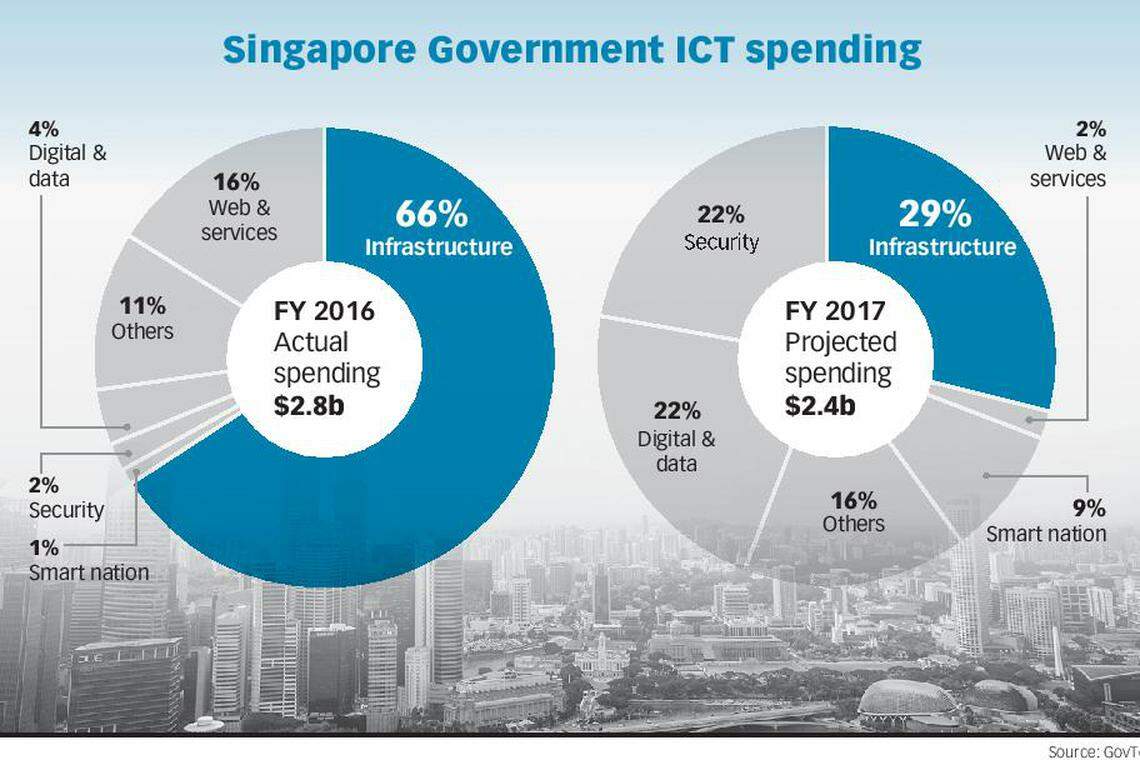Up for grabs: S$2.4b of government tenders in Smart Nation drive
Infocom technology projects will see NLB, MOE, MPA investing in digital and data, cyber-security and Smart Nation applications
Singapore
THE government will be calling for a projected S$2.4 billion worth of ICT (Infocomm Technology) tenders in fiscal 2017 in order to maintain the momentum in Singapore's Smart Nation and digitalisation efforts.
Announcing this on Wednesday at GovTech's annual Smart Nation and Digital Government industry briefing, GovTech chief executive Jacqueline Poh said the government would invest in technologies such as data analytics, sensors and related software and systems. She added that the investment would include a tender for data analytics and another for communications infrastructure to link up data centres with IoT (Internet of Things) sensors.
GovTech will be building a new GDC (government data centre), which will be its third. Another major project on the anvil is a federated SOC (security operations centre) which would serve a vast majority of government departments.
This year's projected spending is lower than fiscal 2016's actual spending of S$2.8 billion.
Commenting on this, Ms Poh said a large component of ICT expenditure in fiscal 2016 was to build the foundation for a Smart Nation and digital government. "This is basic infrastructure that we have to lay out to ensure that there is capacity for the growth of Smart Nation applications. In fiscal 2017, the government intends to spend a larger proportion on digital and data, cybersecurity and Smart Nation applications."
She also said GovTech will be building a whole-of-government sensors-through-wired (fibre) and wireless (narrowband IoT) communications. The government is also building middleware for whole-of-government data sharing from sensors to reap operational efficiencies in urban planning - for example, for crowd control in public areas, flood monitoring, and vehicle congestions.

Middleware refers to software that acts as a bridge between an operating system or database and applications, especially on a network.
The National Library Board (NLB) may be calling for another tender this year for a project called An Immersive Story Telling Room. This had been awarded previously and will be piloted in the third quarter of 2017. It is a multi-projection, multi-sensory room which enables the storyteller to tell a story while animation and sound are played on multiple walls of the room. NLB is also looking to set up a virtual library that would provide NLB's digital content such as e-books, audio e-books, archive AV (audio-visual) content and virtual exhibitions.
The Ministry of Education is planning a Parents Gateway which would allow parents to access digital services such as viewing events, programmes and progress of their children, and providing consent for school programmes and events. The ministry is also planning a digital shopfront for examination operations where candidates can register for exams and receive information, alerts and assistance.
The Maritime and Port Authority is looking at developing MyMaritime@SG, which will include application for permits and approvals, as well as requests for marine services. It is also looking at a Maritime Single Window for submission of all port-related documentation for port clearance in its first phase.
Ms Poh noted that the government would be partnering with industry to increase the deployment of robotics. In this regard, Temasek Polytechnic will be looking for an industry partner to build an inventory robot which would utilise RFID (radio frequency identification) technology to scan the print collection and navigate in its library.
She said: "We will continue to work with the industry and provide them with the foundational support to build Singapore as a Smart Nation. On the other hand, companies will also need to boost their ICT and engineering capabilities to keep up with the fast-changing technological landscape."
Ms Poh added that besides established companies, "there is a growing pool of small and medium enterprises (SMEs) that have stepped up and embraced new technologies. Last year, SMEs accounted for about two-thirds of the total number of ICT contracts awarded."
An example of a local technology SME awarded ICT contracts last year was DC Frontiers, a firm accredited by Infocomm Media Development Authority (IMDA). DC Frontiers offers an artificial intelligence (AI) solution known as Handshakes, which analyses networks of connections between people and companies to give users insights into, among other things, legal ownership, conflicts of interest and possible fraud. Last year, it began working with procurement and internal audit teams in the government to enhance and automate checks for conflict of interest.
Through the Accreditation@IMDA programme, promising ICT SMEs are identified and proactively involved in the government's digital transformation efforts. To date, companies under the programme have won more than 90 projects with various government agencies and are currently engaged in many more project discussions, Ms Poh added.
KEYWORDS IN THIS ARTICLE
BT is now on Telegram!
For daily updates on weekdays and specially selected content for the weekend. Subscribe to t.me/BizTimes
Technology
Meta’s results are best viewed through rose-tinted AI glasses
'Harvesting data': Latin American AI startups transform farming
After long peace, Big Tech faces US antitrust reckoning
Tech’s cash crunch sees creditors turn ‘violent’ with one another
Tech millionaires chase billionaire tax shields with ‘swap fund’
Elon Musk’s Starlink profits are more elusive than investors think
